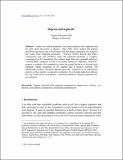Degrees and segments
Author(s)
Schwarzschild, Roger S.
DownloadDegrees and segments.pdf (412.9Kb)
PUBLISHER_POLICY
Publisher Policy
Article is made available in accordance with the publisher's policy and may be subject to US copyright law. Please refer to the publisher's site for terms of use.
Terms of use
Metadata
Show full item recordAbstract
I make two related proposals, one about directed scale segments and the other about the nature of degrees. Bale (2007, 2011) argued that degrees should be analyzed as sets of individuals and that degree arguments are created in the syntax from relational predicates. Schwarz (2010) showed that Bale’s construction runs into problems when the required degree relation is complex, denoted by an LF constituent that contains more than just a gradable adjective. I modify Bale’s proposal so that it overcomes Schwarz’s objection. But first I propose a semantics for comparatives based on quantification over directed scale segments, triples consisting of two degrees and a measure function. The modification of Bale’s proposal depends upon this. Segments are of independent interest as they permit a conjunctive semantics for extended adjectival phrases, the way events do for verb phrases. Potential benefits of ‘degree-conjunctivism’ are explored.
Date issued
2013-05Department
Massachusetts Institute of Technology. Department of Linguistics and PhilosophyJournal
Proceedings from Semantics and Linguistic Theory
Publisher
Linguistic Society of America
Citation
Schwarzschild, Roger. “Degrees and Segments.” Semantics and Linguistic Theory 23 (2013): 212.
Version: Final published version
ISSN
2163-5951